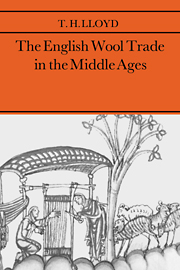Book contents
- Frontmatter
- Contents
- List of Tables and Maps
- Preface
- Abbreviations used in Notes and Bibliography
- 1 The growth of the Flemish connection
- 2 The end of the Flemish ascendancy
- 3 The Italian hegemony
- 4 The English triumphant
- 5 Edward III – woolmonger extraordinary
- 6 Quest for a staple policy
- 7 The evolution of the Calais staple
- 8 The decline of the wool trade
- 9 Marketing the wool
- Notes
- Bibliography
- Index
3 - The Italian hegemony
Published online by Cambridge University Press: 10 December 2009
- Frontmatter
- Contents
- List of Tables and Maps
- Preface
- Abbreviations used in Notes and Bibliography
- 1 The growth of the Flemish connection
- 2 The end of the Flemish ascendancy
- 3 The Italian hegemony
- 4 The English triumphant
- 5 Edward III – woolmonger extraordinary
- 6 Quest for a staple policy
- 7 The evolution of the Calais staple
- 8 The decline of the wool trade
- 9 Marketing the wool
- Notes
- Bibliography
- Index
Summary
The most long-lasting outcome of the dispute with Flanders was the imposition of a permanent customs duty on exported wool, that which in the course of time became known as the magna et antiqua custuma. For the economic historian this is an event of the utmost significance since it has provided him with one of the most valuable of all his medieval records. Constitutional historians, of course, have been more interested in the origins of the tax, which has provided fuel for debate. It is clear that the magnates were party to the formal approval, which was given in an assembly in spring 1275. But what was the form of the all-important consent of the Commons? Was it given by a body representative of the entire commonalty, or by one representing the merchants alone? Gras found no difficulty in accepting Stubbs' doctrine that the custom was granted by a true parliament, but Wilkinson, whose opinion has found more general acceptance, taught that the merchants alone provided the vital constitutional consent.
Gras' confidence in the parliamentary nature of the 1275 grant was strengthened by his conviction of the complete novelty of the custom. He rejected the possibility that it might have any connection with any earlier impost. There are, however, antecedents which, insofar as they involved only the king and the merchants, lend support to Wilkinson's case.
- Type
- Chapter
- Information
- The English Wool Trade in the Middle Ages , pp. 60 - 98Publisher: Cambridge University PressPrint publication year: 1977



